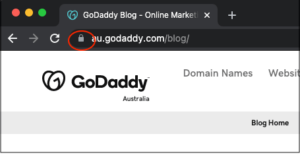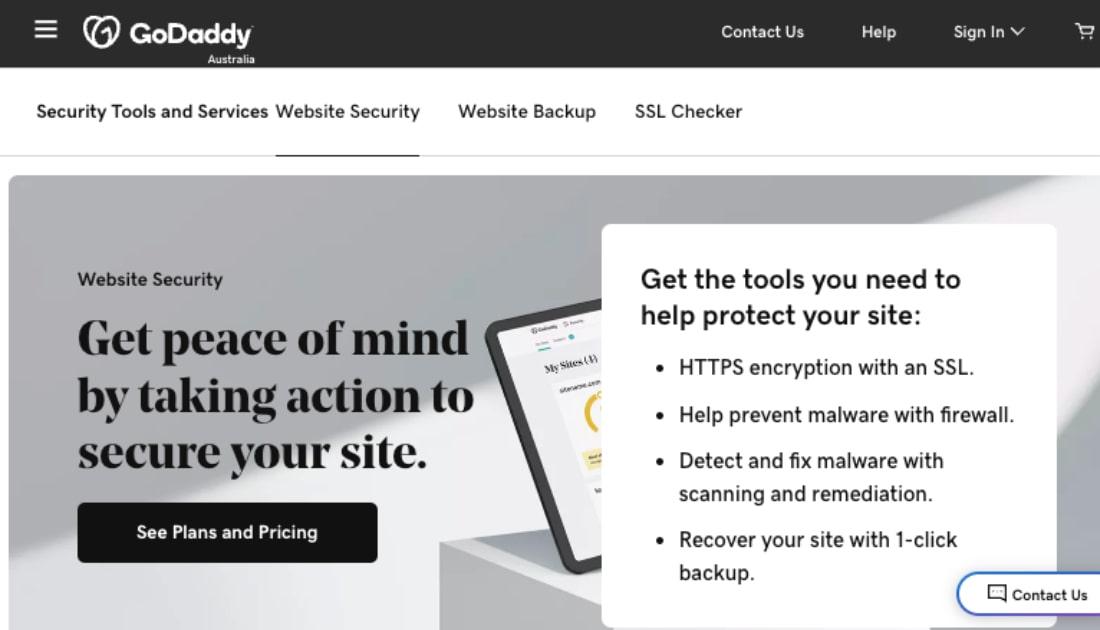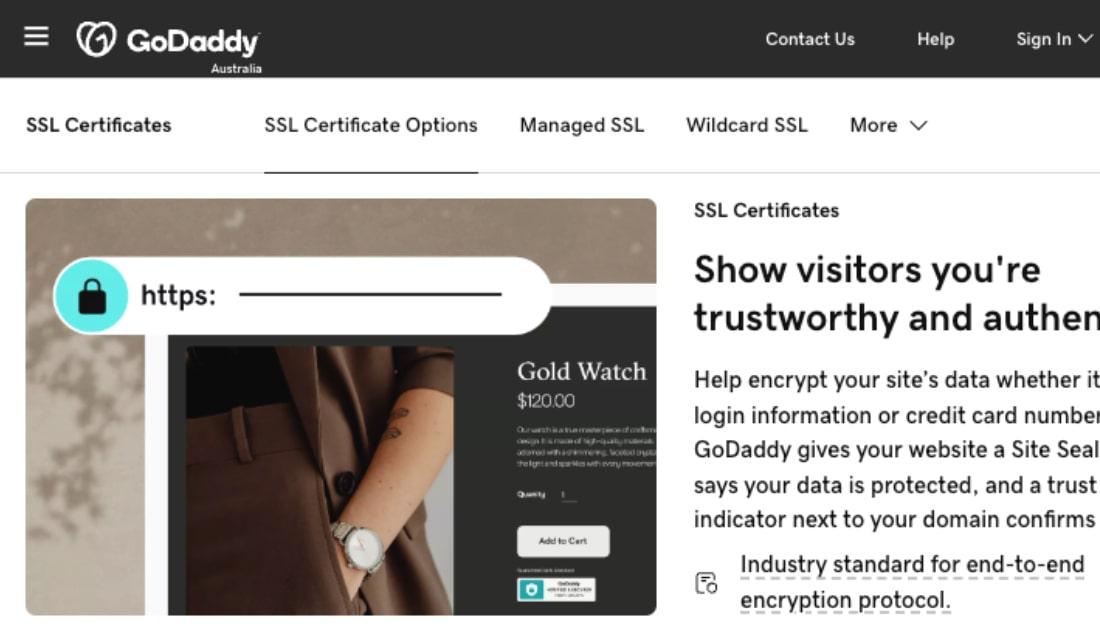Entrepreneurs in Australia are a hardy bunch. The latest figures from the Australian Bureau of Statistics show that more than 365,000 new businesses emerged within the 2020/2021 financial year.
That’s despite all the COVID-19 restrictions imposed in many parts of the country during that time.
GoDaddy regularly surveys small business owners around the world to see what they’re thinking when it comes to their small businesses and technology, including Australian entrepreneurs. Read on to see what we found in our most recent security survey.
Key findings among entrepreneurs in Australia

Our June 2021 survey focused on digital security and included 1,150 Australian entrepreneur respondents.
Let’s take a deeper dive into the different questions and responses found throughout the survey.
Collecting customer information online
According to the GoDaddy survey, 56% of Australian small business owners have websites that process customers’ personal information for e-commerce purposes. That information could include things like:
- Names
- Physical addresses
- Email addresses
- Payment details
Collecting this type of personal information should encourage more Australian business owners to raise their website security standards.
Why? Because this is exactly the information hackers want.
And you only need to read the headlines to see that losing your customers’ personal data is the shortcut to ruin. Most micro or small businesses simply don’t have the resources to survive the harm to their reputations.
Related: 4 security features every online business needs
Importance of cybersecurity
Survey results showed that 74% of entrepreneurs in Australia believe cybersecurity to be “very important” for their businesses. Furthermore, an additional 21% considered it to be “rather important.”
Perceived threat of cyberattacks
When it comes to cyberattacks, more than three quarters of GoDaddy customers in Australia believe that small businesses are under threat.

In a separate question, 37% of those surveyed believed that large companies are more likely to be targeted. An additional 37% felt that the size of the business was irrelevant to the risk of a cyberattack.
Ability to deal with a cyberattack
Just 15% of Australian small business owners believe they have the skills to deal with a cyberattack, while another 40% said they would know who to ask for help.
45% of respondents say they’re unsure of how to deal with a cyberattack or who to ask for help.
This is why it’s important for online business owners to develop a plan and implement prevention procedures to be better prepared.
Most realistic security threats
Malware (83%), phishing (81%) and ransomware (70%) were perceived as the most likely cybersecurity threats by Australian entrepreneurs. Here’s a brief explanation of those threats, if you’re not sure what they are:
- Malware: This is an abbreviation for “malicious software.” Hackers can place this software on your website if you don’t have appropriate cybersecurity measures in place. From there, the malware can infect your customers as well. You can find out how to protect your website from malware here.
- Phishing: This is when a cyberattacker sends a message via an email, text or social media in the hope of getting the recipient to reveal sensitive information like login or bank account details.
- Ransomware: This is a type of malware that involves a cyberattacker infecting your website and then demanding payment to remove the offending software.
Understanding of website security concepts
Most entrepreneurs in Australia (97%) understand what the term ‘hacker’ means in a website security context.
At the other end of the scale, only 56% know what a DDoS attack is. Other less-familiar website security concepts for Australian entrepreneurs include HTTPS encryption and SSL certificates. Below, we’ll provide a quick recap of what each one means for reference:
 DDoS attack: For those that are either unsure or have never heard of it before, a DDoS (Distributed Denial of Service) attack is where a website will be sent multiple requests with the aim of exceeding its capacity to respond. This, in turn, shuts the website down, costing Aussie entrepreneurs in lost sales.
DDoS attack: For those that are either unsure or have never heard of it before, a DDoS (Distributed Denial of Service) attack is where a website will be sent multiple requests with the aim of exceeding its capacity to respond. This, in turn, shuts the website down, costing Aussie entrepreneurs in lost sales.- HTTPS encryption: This enables you to have secure data transfer over the internet, basically creating a secure tunnel through which all information can travel. HTTPS encryption requires installing an SSL certificate on your website.
- SSL certificates: These electronic certificates help verify a website’s identity and enables users to have an encrypted connection with it. If you have one, your web address will have a padlock beside it in the browser bar. It will give web users confidence to proceed to it because it indicates that it’s a safe, encrypted site.
Editor’s note: Fully protect your website from malware and hackers with Website Security from GoDaddy. Includes a firewall, SSL encryption, malware scanning and one professional site clean up per year.
Most important website security measures
From the Australian entrepreneurs surveyed, 72% believed that firewalls were the most important website security feature to have. This was followed by:
- SSL certificates (70%)
- Site back-up capabilities (70%)
- Malware scanning (67%)
Biggest cybersecurity fears
Loss of time dealing with the issue (63%) and loss of customer trust (61%) were the two biggest fears that Australian entrepreneurs had when it comes to cybersecurity attacks.
Time is money for entrepreneurs.
Once a customer’s trust is lost, it can be very difficult or impossible to regain.
Purchase of website security protection
When it comes to purchasing web security protection, 34% of Australian entrepreneurs claimed they had bought a website security solution. A further 30% claimed they had researched a potential solution, but had not yet bought one from a cybersecurity provider.
Disturbingly (given the prevalence of online data security breaches), 36% had not bought or researched a website security solution.
This may be due to finding the cybersecurity provider’s product information to be difficult to understand. When asked how they interpreted the information available to them, 39% of Australian respondents found cybersecurity product information to be either “a little unclear” or “very unclear.”
Profile of Australian survey takers
Among the entrepreneurs GoDaddy surveyed in Australia, 50% were sole traders and a further 29% had less than four staff. The majority (66%) were running businesses that have been in operation for less than 5 years.
When asked how they would classify their technical website knowledge, 53% described themselves as having a “medium” understanding, while 30% believed their knowledge was “low.”
How Aussie entrepreneurs compare internationally
Like Australia, 30% of Canadian entrepreneurs described their technical website knowledge as ‘low.’ However, other countries in the survey had far fewer entrepreneurs in this category.
For example, only 11% of Italian entrepreneurs described their technical website knowledge as being ‘low.’
Compared to European respondents, Canadian and Australian survey participants were also less likely to have:
- Deal with cyberattacks
- Bought or researched website security solutions
They were also more likely to have experienced a website security breach.
Takeaways for entrepreneurs in Australia
The key takeaways from the survey are that the majority of Australian entrepreneurs:
- Collect sensitive customer information online for e-commerce purposes. They fear losing customer trust if that information is leaked in a cyberattack.
- Believe cybersecurity is important. They also feel that cyberattacks pose a major threat to small businesses in particular.
- Currently lack the skills to deal with a cyberattack. Many also claimed they had not purchased cybersecurity protection.
Investing in cybersecurity software for your business should be a no-brainer. It’s as vital for your business in the digital age as having an online presence. If your business website isn’t adequately protected, your business is at risk of being digitally attacked at any time, from anyone, and anywhere in the world.









